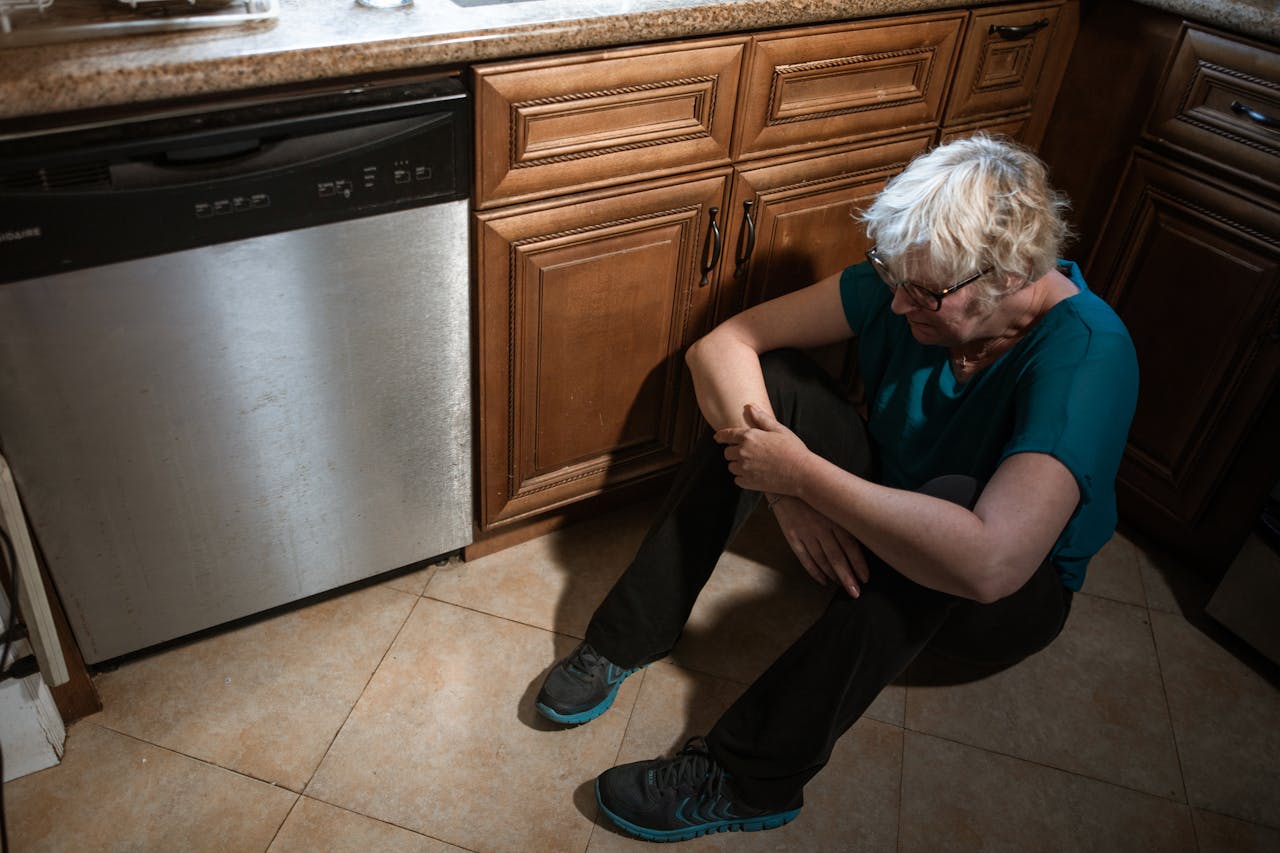Aging is often seen through the lens of physical changes, but it also brings about significant emotional challenges that are sometimes overlooked. These struggles can affect not only the elderly but also their loved ones who may not fully understand the emotional toll of getting older. Whether it’s the loss of independence or the anxiety of facing an uncertain future, aging presents a complex emotional journey. Here are 15 emotional struggles of aging that everyone should understand.
1. Fear of Losing Independence
One of the most significant emotional struggles as people age is the fear of losing their independence. As physical abilities decline, many elderly individuals worry about becoming reliant on others for basic tasks, which can lead to feelings of helplessness and a loss of dignity. This fear often leads to resistance to assistance, even when it’s needed, creating internal conflict and anxiety. For many, the idea of depending on others for everyday activities such as driving, shopping, or managing personal care can be a difficult emotional hurdle to overcome. It is not just about physical limitations but also about maintaining a sense of autonomy and self-worth.
2. Loneliness and Social Isolation
As people age, they may experience a shrinking social circle due to the loss of friends and family members or physical limitations that make socializing more difficult. Loneliness can have a profound impact on mental health, leading to feelings of depression and a sense of being forgotten or irrelevant. This emotional struggle can be exacerbated by the stigma surrounding aging, which sometimes isolates older individuals even further. Without regular social interaction, older adults may feel disconnected from the world around them, leading to a deep sense of isolation that can affect their overall well-being. The lack of companionship can create a void, and for many, it becomes a constant emotional battle.
3. Grief Over the Loss of Loved Ones
Grief is a natural part of aging, as individuals experience the loss of friends, spouses, and family members. This emotional burden can be overwhelming, especially when it feels like everyone around them is passing away. The emotional toll of losing loved ones is compounded by the realization that time is limited, making it harder to process these losses. As people grow older, they may also face the painful reality of not being able to attend the funerals of distant relatives or friends due to physical limitations or distance, which only intensifies the feeling of being left behind. Coping with grief in older age can be emotionally exhausting, especially when there is no one left to share the burden.
4. Fear of Dying
The inevitability of death is a universal fear that becomes more pronounced as people age. For many older adults, the fear of dying is not just about the end of life but also about the unknowns associated with it. They may worry about what will happen to them after death, how their family will cope, or whether they will have lived a meaningful life. This fear can manifest in many ways, from existential anxiety to physical symptoms like insomnia or stress. The uncertainty of the afterlife, or the fear of being forgotten, can become an overwhelming source of emotional distress for many aging individuals.
5. Loss of Purpose
As people retire or transition into a new phase of life, they may struggle with a sense of purposelessness. For many, their careers and roles as caregivers or parents provided a sense of identity and meaning. When these roles change or end, it can lead to feelings of emptiness and a loss of direction, which can be emotionally draining. The lack of a clear purpose or goal can lead to feelings of inadequacy or confusion. Older adults may feel as though they have nothing to contribute anymore, and this emotional struggle can result in depression or a diminished sense of self-worth.
6. Fear of Being a Burden
As physical and mental health decline, older adults may worry about becoming a burden to their families. This fear can lead to feelings of guilt and shame, especially if they are unable to care for themselves as they once did. The emotional struggle of feeling like a burden can cause significant stress and anxiety, leading many elderly individuals to resist seeking help even when they need it. This can result in a vicious cycle where their reluctance to ask for assistance leads to further physical or emotional decline, exacerbating the feeling of being a burden. Many elderly people also fear the impact their needs may have on their loved ones’ lives, adding to the emotional strain.
7. Dealing with Physical Decline
While physical decline is often inevitable as people age, it can have a significant emotional impact. The inability to do things that were once easy, such as walking or driving, can lead to frustration, sadness, and a loss of self-worth. The emotional toll of not being able to maintain a once-active lifestyle can be difficult to manage, especially when it affects a person’s sense of autonomy. The inability to participate in hobbies or activities that once brought joy can lead to feelings of isolation and depression. Furthermore, constant pain or physical discomfort can exacerbate these emotional struggles, making it difficult to enjoy even the simplest pleasures in life.
8. Memory Loss and Cognitive Decline
Cognitive decline is a common concern for many aging individuals. Forgetting names, dates, or important events can cause embarrassment and frustration. The fear of developing conditions like dementia or Alzheimer’s can also lead to anxiety, as individuals worry about losing their mental faculties and becoming dependent on others for even basic tasks. The emotional toll of cognitive decline can also affect relationships, as older adults may feel self-conscious or embarrassed when they forget things in front of loved ones. This can lead to a sense of shame and the fear of being misunderstood or dismissed.
9. Financial Stress
Many older adults face financial challenges in their later years, particularly if they are living on a fixed income or have outlived their savings. The fear of running out of money, not being able to afford medical care, or being unable to maintain their lifestyle can cause significant emotional distress. Financial worries can also contribute to feelings of inadequacy or guilt, especially if they have to rely on family members for financial support. The stress of managing finances in old age can lead to feelings of anxiety and helplessness, particularly when individuals are faced with unexpected expenses or rising healthcare costs.
10. Changes in Appearance
As people age, their appearance changes. Wrinkles, gray hair, and weight gain or loss are all common aspects of aging. While these changes are natural, they can be emotionally difficult to accept, especially in a society that values youth and beauty. Older adults may struggle with feelings of unattractiveness or invisibility, which can impact their self-esteem and confidence. The emotional impact of these changes can also affect how they interact with others, as they may feel self-conscious or insecure in social situations. The desire to maintain a youthful appearance can lead to frustration or dissatisfaction, particularly when it feels like their external appearance no longer reflects how they feel inside.
11. Struggling with Technology
The rapid pace of technological advancement can leave older adults feeling overwhelmed and disconnected. From smartphones to social media, technology can be difficult to navigate, leading to feelings of frustration and alienation. The inability to keep up with technological changes can contribute to a sense of being left behind or irrelevant, further isolating elderly individuals from the world around them. This struggle can also lead to a sense of frustration or inadequacy, as older adults may feel they are missing out on important social connections or information that is now primarily shared online.
12. Fear of Losing Mental Clarity
Many older adults fear losing their mental sharpness, especially when they notice small lapses in memory or concentration. The fear of becoming forgetful or confused can lead to anxiety and self-doubt. This emotional struggle is often tied to the fear of developing conditions like dementia, which can rob them of their independence and sense of self. The uncertainty surrounding cognitive decline can be a constant source of stress, as individuals worry about their ability to function in daily life. The fear of losing mental clarity can also lead to a reluctance to engage in activities that might stimulate the mind, further exacerbating the problem.
13. Dealing with Chronic Pain
Chronic pain is a common issue for many aging individuals, whether it’s due to arthritis, back problems, or other conditions. The constant discomfort can lead to emotional distress, including feelings of frustration, depression, and helplessness. Chronic pain can also limit an individual’s ability to engage in activities they once enjoyed, further exacerbating feelings of isolation and sadness. The emotional toll of living with chronic pain can be overwhelming, as it affects not only physical well-being but also mental health. For many, the struggle with pain can feel never-ending, leading to a diminished quality of life.
14. Regret Over Missed Opportunities
As people age, they may reflect on their lives and experience regret over missed opportunities or unfulfilled dreams. Whether it’s a career they didn’t pursue, relationships they neglected, or experiences they never had, these regrets can be emotionally painful. The realization that time is running out can make these feelings even more intense, leading to a sense of sorrow and longing. For many, this emotional struggle is compounded by the realization that they may never have the chance to correct these perceived mistakes or take advantage of new opportunities.
15. Adjustment to Retirement
Retirement is often seen as a time of relaxation and enjoyment, but it can also be a time of emotional adjustment. The transition from a busy career to a more leisurely lifestyle can be difficult for some, especially if their sense of identity was tied to their work. The lack of structure, purpose, and social interaction can lead to feelings of depression and a loss of self-worth. For some, the adjustment to retirement can be a long and difficult process, as they struggle to find new ways to stay engaged and fulfilled. The emotional challenges of retirement can affect not only the individual but also their relationships with family and friends.
Final Thoughts
Aging is an inevitable part of life, but it’s important to recognize that it comes with emotional challenges that are just as significant as the physical changes. By understanding and acknowledging these struggles, we can better support the older generations and ensure they feel valued, respected, and understood. Whether it’s offering a helping hand, engaging in meaningful conversations, or simply providing emotional support, we all have a role to play in easing the emotional burdens that come with aging.

















